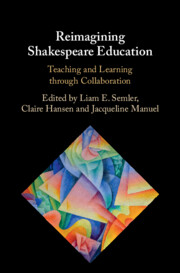Book contents
- Reimagining Shakespeare Education
- Reimagining Shakespeare Education
- Copyright page
- Dedication
- Contents
- Figures
- Tables
- Notes on Contributors
- Acknowledgements
- Introduction
- Part I Reimagining Shakespeare with/in Schools
- Part II Reimagining Shakespeare with/in Universities
- Part III Public Reimaginings
- Part IV Digital Reimaginings
- Part V Reimagining Performance
- Afterword
- Index
- References
Part I - Reimagining Shakespeare with/in Schools
Published online by Cambridge University Press: 02 February 2023
- Reimagining Shakespeare Education
- Reimagining Shakespeare Education
- Copyright page
- Dedication
- Contents
- Figures
- Tables
- Notes on Contributors
- Acknowledgements
- Introduction
- Part I Reimagining Shakespeare with/in Schools
- Part II Reimagining Shakespeare with/in Universities
- Part III Public Reimaginings
- Part IV Digital Reimaginings
- Part V Reimagining Performance
- Afterword
- Index
- References
Summary

- Type
- Chapter
- Information
- Reimagining Shakespeare EducationTeaching and Learning through Collaboration, pp. 21 - 84Publisher: Cambridge University PressPrint publication year: 2023

